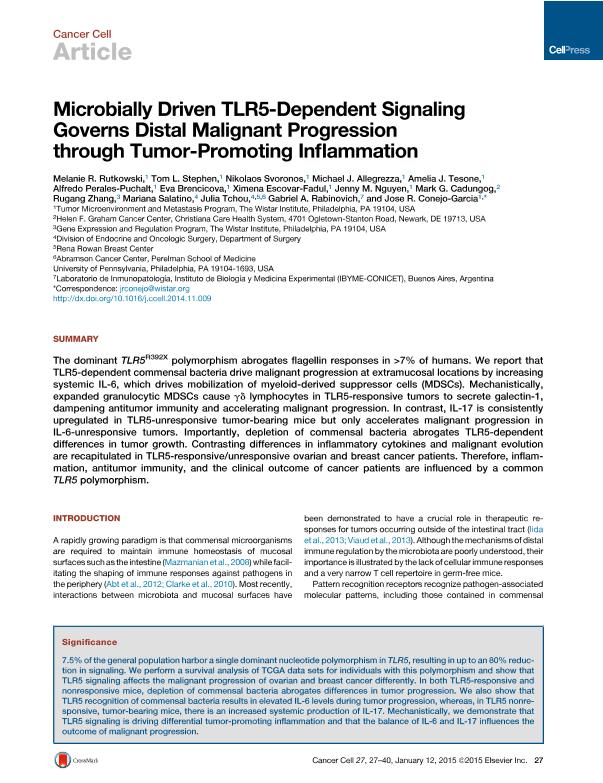Artículo
Microbially driven TLR5-dependent signaling governs distal malignant progression through tumor-promoting inflammation
Rutkowski, Melanie R.; Stephen, Tom L.; Svoronos, Nikolaos; Allegrezza, Michael J.; Tesone, Amelia J.; Perales Puchalt, Alfredo; Brencicova, Eva; Escovar Fadul, Ximena; Nguyen, Jenny M.; Cadungog, Mark G.; Zhang, Rugang; Salatino, Mariana ; Tchou, Julia; Rabinovich, Gabriel Adrián
; Tchou, Julia; Rabinovich, Gabriel Adrián ; Conejo Garcia, Jose R.
; Conejo Garcia, Jose R.
 ; Tchou, Julia; Rabinovich, Gabriel Adrián
; Tchou, Julia; Rabinovich, Gabriel Adrián ; Conejo Garcia, Jose R.
; Conejo Garcia, Jose R.
Fecha de publicación:
12/01/2015
Editorial:
Cell Press
Revista:
Cancer Cell
ISSN:
1535-6108
e-ISSN:
1878-3686
Idioma:
Inglés
Tipo de recurso:
Artículo publicado
Clasificación temática:
Resumen
The dominant TLR5(R392X) polymorphism abrogates flagellin responses in >7% of humans. We report that TLR5-dependent commensal bacteria drive malignant progression at extramucosal locations by increasing systemic IL-6, which drives mobilization of myeloid-derived suppressor cells (MDSCs). Mechanistically, expanded granulocytic MDSCs cause γδ lymphocytes in TLR5-responsive tumors to secrete galectin-1, dampening antitumor immunity and accelerating malignant progression. In contrast, IL-17 is consistently upregulated in TLR5-unresponsive tumor-bearing mice but only accelerates malignant progression in IL-6-unresponsive tumors. Importantly, depletion of commensal bacteria abrogates TLR5-dependent differences in tumor growth. Contrasting differences in inflammatory cytokines and malignant evolution are recapitulated in TLR5-responsive/unresponsive ovarian and breast cancer patients. Therefore, inflammation, antitumor immunity, and the clinical outcome of cancer patients are influenced by a common TLR5 polymorphism.
Palabras clave:
Bacteria
,
Tlr5
,
Myeloid-Derived Suppresor Cells
,
Tumor
Archivos asociados
Licencia
Identificadores
Colecciones
Articulos(IBYME)
Articulos de INST.DE BIOLOGIA Y MEDICINA EXPERIMENTAL (I)
Articulos de INST.DE BIOLOGIA Y MEDICINA EXPERIMENTAL (I)
Citación
Rutkowski, Melanie R.; Stephen, Tom L.; Svoronos, Nikolaos; Allegrezza, Michael J.; Tesone, Amelia J.; et al.; Microbially driven TLR5-dependent signaling governs distal malignant progression through tumor-promoting inflammation; Cell Press; Cancer Cell; 27; 1; 12-1-2015; 27-40
Compartir
Altmétricas



